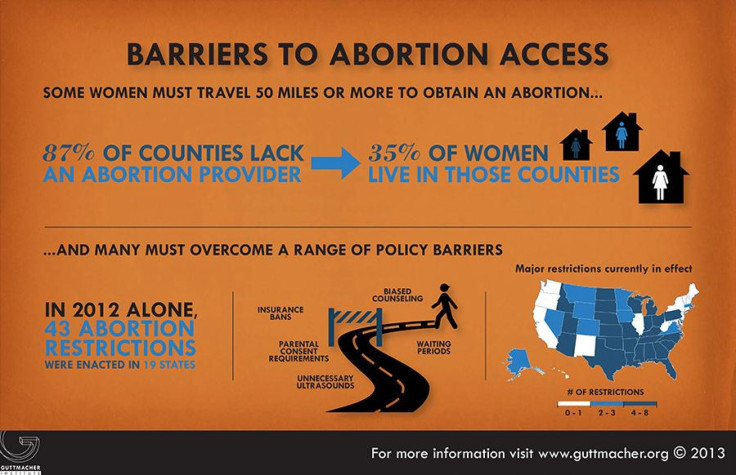A New Year, The Same Fight: Anti-Abortion States To Watch in 2013

The 2012 election may be over, but the fight over women’s reproductive rights definitely is not.
Last year’s race for the presidency and fights in the House and Senate spawned the so-called “war on women” and introduced the concept of “legitimate rape to the American public. Women, who lawmakers apparently suddenly realized make up a majority of the electorate, were being unabashedly courted by members of both parties. Their concerns mattered. Until Election Day, that is.
The spotlight on women’s issues may be fading, but the push to limit reproductive rights continues across the nation. In 2012, 19 state legislatures passed 43 laws to make it harder for women to terminate a pregnancy, according to the Guttmacher Institute, an abortion rights group.
It may not have equaled the onslaught of anti-abortion legislation seen in 2011 -- when more than 90 new restrictions were passed -- but 2012 saw a surge in attempts to limit abortion access. The most prevalent proposals, according to the Center for Reproductive Rights, included: insurance restrictions that eliminate coverage for abortion, targeted restrictions on abortion providers (typically imposing burdensome requirements on small clinics that force them to meet the same standards as hospitals) and “refusal clauses” allowing individuals and medical institutions to deny patient care because of moral or religious beliefs.
“Following on the heels of the worst year for reproductive health and rights in a generation, 2012 still saw more restrictions on abortion and other reproductive health care than in almost any other year,” the center said in a year-end report released this week.
It’s not all bad news, or good, depending on point of view. A new wave of abortion rights activism also emerged in 2012, according to the group.
“Legislators, advocates, providers and patients came forward in droves to make their voices heard and to protest the harmful legislation introduced and pushed by anti-choice activists,” states the report.
Still – 21 states currently have legislatures and governors that oppose abortion rights, by the center's count. While recent exit polling suggests a majority of voters support legal access to abortion in most cases, lawmakers in several states are moving forward with their attempts to restrict it. Here are some states to watch in 2013:
Mississippi: The fate of the state’s only abortion clinic is in the balance, after state lawmakers passed a law in April requiring that all doctors who provide abortion services have admitting privileges at a local hospital. But all of the doctors at the Jackson Women’s Health Organization have had those applications rejected by every hospital they have approached, according to the CRR. Because the clinic is unable to comply with the law due to the state’s clear anti-abortion stigma, the group has asked a judge to declare the law unconstitutional.
Wisconsin: The state may have enacted three different pieces of anti-abortion legislation last year, but they’re apparently ready for more. The Republican-controlled Legislature is already devising a law that would force women to view an ultrasound of the fetus before terminating a pregnancy, according to state media reports. Other regulations that may be taken up include banning abortion after the 20th week or pregnancy and forbidding public employees from using their health insurance to cover abortion services.
Virginia: In September, the state’s Board of Health voted to require all abortion clinics to comply with strict new building codes – meaning, they must make expensive upgrades to their facilities or face closure. Although Republican Gov. Bob McDonnell signed off on the law last month, it’s scheduled to undergo another public comment period and Board of Health vote before taking effect.
That’s not all. Republican state Delegate Bob Marshall, one of the legislature’s most vocal abortion opponents, has proposed legislation that would outlaw abortions done for the purpose of gender selection, a practice that medical professionals agree is extremely rare in the United States. But abortion right advocates fear the law could be used as a stepping-stone to impose further restrictions.
Another lawmaker, Republican Sen. Tom Garrett, has proposed a bill that would eliminate state funding for abortions to low-income women who learn of extreme fetal deformities.
Indiana: Two anti-abortion state senators are set to propose a measure that would force doctors to present a brochure called “A Woman’s Right to Know” to women considering an abortion. The packet, according to the Courier-Journal, would include detailed color photos depicting the fetus at various levels of development and information on adoption services. The packet would also detail the risks of aborting the pregnancy compared to carrying to full term.
Republican Sen. Jim Banks told the newspaper he wants to “strengthen the language” in the "information packets," noting that the same information is already available on the state’s Health Department website.
Texas: State officials have already succeeded in defunding Planned Parenthood clinics, a policy that went into effect on Jan. 1, and implementing a law requiring pregnant women to seek invasive sonograms or listen to the fetal heartbeat before obtaining an abortion.
Now Republican Gov. Rick Perry -- who has proclaimed his ultimate “goal” is completely outlawing abortion in the state – is pushing a “fetal pain” bill that would outlaw the procedure after 20 weeks, while some lawmakers are advancing a bill that would completely outlaw abortion-inducing medications -- which could include some contraceptives. This year state officials will also begin collecting information on women seeking abortions and doctors who provide those services, which will be stored by the state Health and Human Services Commission.
© Copyright IBTimes 2024. All rights reserved.





















